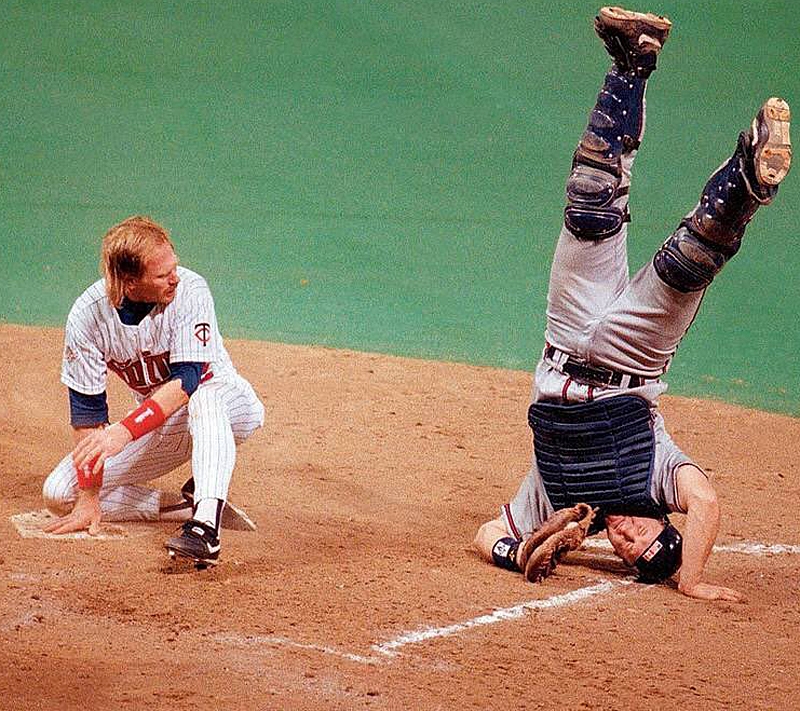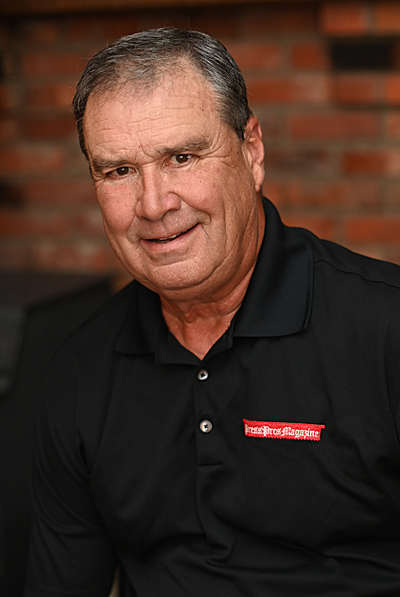
Twins outfielder Dan Gladden (above, left) attempting to score against Braves catcher Greg Olson in the 1991 World Series. (Photo Courtesy Of Private Collection)
An unfortunate, questionable call at the conclusion of Thursday’s Iowa-Illinois game had many of us asking…have we made the rules of the game such that it’s hard to stomach baseball?
 Omaha, NE – By now nearly everyone has seen the play on ESPN or the Big Ten Network; and certainly it’s all over social media.
Omaha, NE – By now nearly everyone has seen the play on ESPN or the Big Ten Network; and certainly it’s all over social media.
The play at second base in the tenth inning of a 2-2 tie between Iowa and Illinois Thursday where an Iowa runner was called out by umpire Grady Smith for interference while attempting to break up a double play…when replay showed nothing to justify such a call.
It caused a stoppage in play for five minutes to have a video review, only to have Smith emerge from the replay booth after reviewing his own call to confirm that the play would stand as called.
It set off a confrontation between Iowa coach Rick Heller and the umpires, Heller’s subsequent ejection…and then a stadium-wide debate over umpires’ judgment, phantom calls, and the age-old argument of the timing of a call like that. Players should determine the outcome of a game in the bottom of the tenth inning, and not the umpires.
Or in this case…was it the rule book?
“I’ve seen the replay twenty times and I still don’t see what they saw,” said Heller in the post-game press conference. “In fact, I was sure they would come back from reviewing it and reverse the call, or call our guy safe because their guy didn’t touch second base.”
And then…Heller was asked another obvious elephant-in-the-room question. Have we gone too far for the sake of player safety as to have legislated the competitive culture out of baseball?
“I’ve never been a fan of the sliding rule at second base,” he answered.
Here's another look at the runner's interference called against Kyle Huckstorf.
Iowa down 4-2 in extras against Illinois with bases loaded and no outs in the bottom of the 10th.
This is an elimination game.
Doesn't seem like interference to me.#Illini #Hawkeyes pic.twitter.com/hphDWLcK1A
— Said Bravo (@Said_Bravo1) May 23, 2024
That’s all he said. Rick Heller is old school, the way a lot of people who know the game (better than the ‘suits’) prefer the game to be played.
More, as in contact with basketball…have we put too much pressure on the officials to interpret something that isn’t there, and that no one can justify.
And, are we headed farther down the path of players, coaches, and fans distrusting the ultimate authority on the field?
There are now so many specific rules governing how baseball can be played as to totally negate the competitive history of the game, and the culture of its greatest players – hall of famers – and how they played the game. Bob Gibson and Don Drysdale would spit in the eye of an umpire in this day who said that you couldn’t pitch inside for the sake of intimidating a hitter. It was once said about Gibson that he would hit his own grandmother if she stood too close to home plate.
You can’t make contact with the catcher on a play at the plate now, for the sake of knocking the ball loose and while trying to score…as Pete Rose once did in the 1970 All-Star game, or the Twins Dan Gladden did in the 1991 World Series. Those plays are still two of the epic moments in the history of modern baseball.
Hard contact is forbade now in an attempt to break up the double play at second base…because players like the Mets Ruben Tejada had his leg broken during the 2015 playoffs. The Reds Ron Oester suffered a serious ACL injury on a similar play in 1987. But those plays are the exception and not the rule, robbing the game of some of its most enduring competitive attributes.
For the sake of safety, they changed the rules, yes…but have they gone so far as to create a situation like Thursday’s where no one but Grady Smith saw safety as an issue, thereby bringing himself into the spotlight for making what appeared to be a phantom call? A play that without question changed the momentum, and the likely outcome of the game.
The majority opinion at the Big Ten Tournament on Thursday was ‘yes’, despite the conference supervisor of officials publicly stating that Smith had only made a call that was consistent with the letter of the law.
Because, there are those who want sports to be safe at any cost…largely people who have never known a competitive moment in their life, including legislators.

Editor/publisher Sonny Fulks writes OHSAA and Big Ten sports for Press Pros Magazine.
And perhaps worse, for the sake of authority on the field, has it come to the point of creating distrust of officials?
We asked.
“I’d say that the umpiring in the league is about what you’d expect it to be,” said one player.
Another: “It’s hard to know what to think when you see things like that.”
And remember now…it isn’t necessary.
Injury and risk are as much a part of sports and competition as the fan who boos from the stands, who no longer understands whether it’s a foul, or part the game.
And for the sake of the game, it’s no longer confined to the stands.

